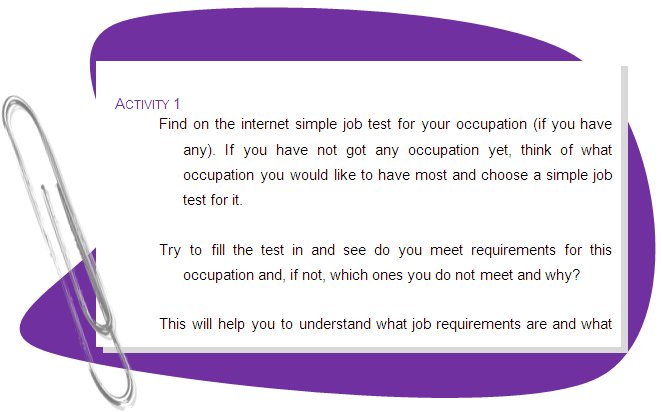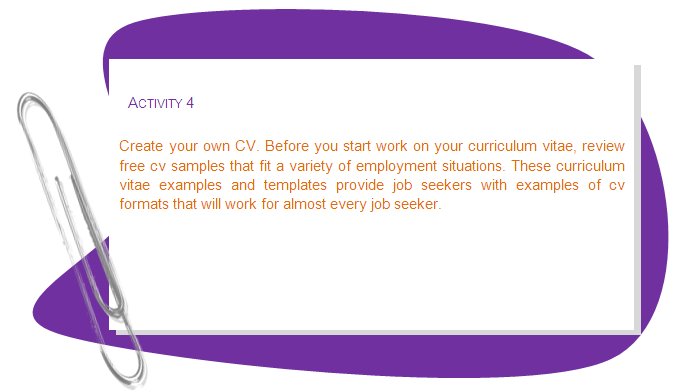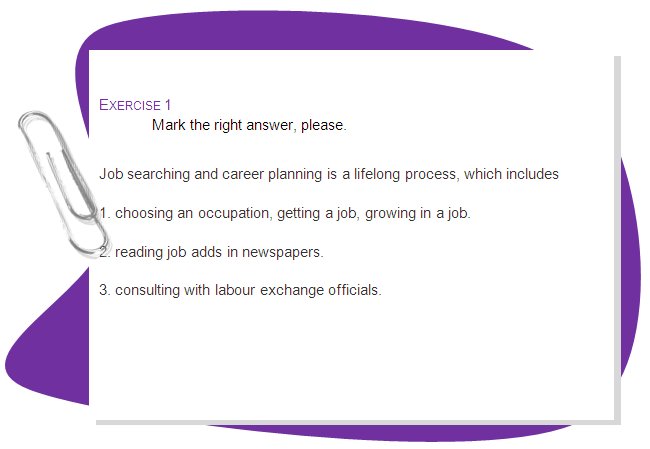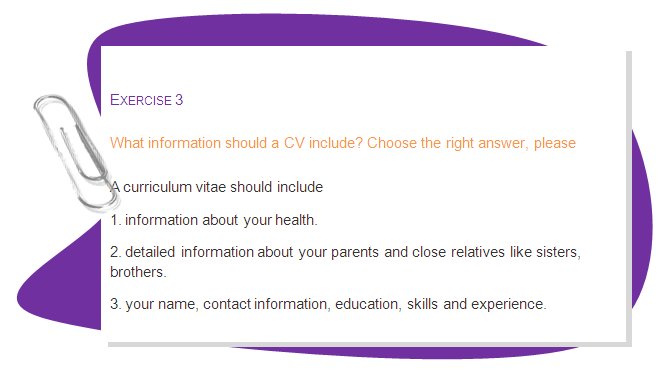Key Competencies Kit
for Facing Lifelong Learning


 |
This Project has been funded with support from the European Commission. This communication reflects the views only of the author, and the Commission can not be held responsible for any use which may be made of the information contained therein. |
 |
Didactic Unit 4 |
Theme |
Time |
Skills for effective lifelong learning 3 |
occupational awareness and new skills; |
5 hours |
job search (job application, interview); |
||
acquired skills for improving career opportunities; |
||
acquired skills for formulating future learning goals; |

Lifelong learning is a rewarding process that brings benefits beyond income earning, career and competitiveness in the labour market. However, most often people link it to success in finding job.
People who have strong social skills have more chances to find job because they can:
 |
There are hundreds of job and career options in the labour market. How do you make a choice when you don't really know what you want to do? Does it seem like a very difficult task? It's not. Yes, you will have to put some time and energy into making your decision, but your effort will be well worth it in the end. |
Job searching and career planning is a lifelong process, which includes choosing an occupation, getting a job, growing in a job, possibly changing careers, and eventually retiring.
Before you can make a job choice you have to learn about yourself. Your values, interests, and skills acquired through learning, in combination with certain personality traits, will make some jobs especially suitable for you and some particularly inappropriate.
You can use self assessment tools, often called job tests, to gather this information and, subsequently, to generate a list of occupations that are appropriate.

Some people choose to have job advisers or other career development professionals administer these tests but many opt to use free job tests that are available on the Web.
Most common myths about choosing a job
Choosing a job is simple. Actually, choosing a job is an involved process and you should give it the time it deserves. Job searching is a multi-step process that involves learning enough about yourself and the occupations which you are considering in order to make an informed decision.
A job counsellor can tell me what occupation to chose. A job counsellor, or any other career development professional, can't tell you what job is best for you. He or she can provide you with guidance in choosing a job and can help facilitate your decision.
You can not make a living from your hobby. Says who? When choosing a job, it makes perfect sense to choose one that is related to what you enjoy doing in your spare time, if you so desire. In addition people tend to become very skilled in their hobbies, even though most of the skill is gained informally.
Making a lot of money will make you happy. While salary is important, it isn't the only factor you should look at when choosing a job. Countless surveys have shown that money doesn't necessarily lead to job satisfaction. For many people enjoying what they do at work is much more important. However, you should consider earnings, among other things, when evaluating an occupation.
Once you choose a job you will be stuck in it forever. Not true. If you are unsatisfied in your job for any reason, you can always change it. Many people change job s several times over the course of their lifetimes. One of the factors that makes lifelong learning so important is be secure in changing labour market.
If you change careers my skills will go to waste. Your skills are yours to keep. You can take them from one job to another. You may not use them in the exact same way, but they won't go to waste. Transferable skills are the skills you've gathered through lifelong learning, various jobs, volunteer work, or other life experiences that can be used in your next job or new career. In addition to being useful to career changers, transferable skills are also important to those who are facing a layoff, new graduates who are looking for their first jobs, and to those re-entering the workforce after an extended absence.
If your best friend (or somebody closet o you) is happy in a particular field, I will be too. Everyone is different and what works for one person won't necessarily work for another, even if that other person is someone with whom you have a lot in common. If someone you know has a job that interests you, look into it, but be aware of the fact that it may not necessarily be a good fit for you.
All you have to do is chose an occupation... Things will fall into place after that. Choosing an job is a great start, but there's a lot more to do after that. A job search is a road map that takes you from choosing a job to becoming employed in that occupation to reaching your long-term career goals.
There's very little you can do to learn about an occupation without actually working in it. While fist hand experience is great, there are other ways to explore an occupation. You can read about it either in print resources or online. You can also interview those working in that field.
 |
There are hundreds of job and career options in the labour market. How do you make a choice when you don't really know what you want to do? Does it seem like a very difficult task? It's not. Yes, you will have to put some time and energy into making your decision, but your effort will be well worth it in the end. |
Personal planning is a disciplined thought process, which produces fundamental decisions and actions that shape and guide who you are, where you are going, what you do, and how, when and why you do it. All of this is done with a focus on the future
The purpose of personal strategic planning is to help you:
Activity 2
Here are important steps in job search that will help you to practice your skills. Follow them carefully and practice on each step.
1. Make a list of occupations to explore. For each occupation on your list, you will want to look at the job description, educational and other requirements, job outlook, advancement opportunities, and earnings
2. Job exploration is the second stage of the process. You will begin to explore jobs after completing the first stage of search process - self-assessment. During that stage you took inventory of your values, interests, personality and skills.
Now it's time to learn about the jobs on your list so you can begin to make that list shorter. Your goal is to eventually narrow it down to the one job you want to pursue. Even if you think you know about an occupation, you may be surprised by what you learn.
At first you will just want to gather some basic information about each job on your list. Let's assume you have a list of five occupations. You can do some preliminary research which will allow you to narrow down your list before you do more in depth research. When exploring jobs you will need basic information such as job descriptions, job outlook, earnings and educational and training requirements. For basic information, use job briefs.
After reading up on the jobs on your list you will find that several of them don't appeal to you. For example, you may decide that you wouldn't enjoy the job duties of a particular job or that you can't (or choose not to) meet its requirements. The earnings may be lower than you thought or its outlook doesn't look promising. In the end, you will be left with a list with no more than about three jobs on it.Here are important steps in job search that will help you to practice your skills. Follow them carefully and practice on each step.
Clean down your list of possible occupations based on what you learned from your research. For example, you may not be willing to put the time and energy into preparing for an occupation for which an advanced level of education is required, or you may consider the earnings for a particular occupation inadequate.3. Set your own goals. By now you should have decided on one occupation you want to pursue. It's time to put a plan in place so you can eventually find a job in that field, but first you will need set goals. In order for your goals to be achievable, they must be:
- Conceivable: you must be able to put your goal into words;
- Achievable: you must have energy and time to accomplish your goal; and achievable within a defined time frame;
- Believable: you must believe you can reach your goal;
- Clearly defined: you must know exactly what your goal is;
Break your job search goals down into short-term and long-term goals (similar to what we studied regarding learning goals). Short-term goals are goals you can reach in one year or less. Long-term goals are ones that are attainable in one to five years.
In order to reach your goals, you will have to get around any barriers you may face. List those barriers and your solutions for dealing with them.
Important part of successful job search is well done job interview. Job interviews are always stressful - even for job seekers who have gone on many interviews. The best way to reduce the stress is to be prepared. Take the time to review the "standard" interview questions you will most likely be asked. Also review sample answers to these typical interview questions.
Possible Interview Questions:
Work History
Personal
Questions About the New Job
The Future

Like a resume, a curriculum vitae should include your name, contact information, education, skills and experience. Start by making a list of all your background information, then organize it into categories.
It's often helpful to take a look at a sample or two before you start writing.
What information should a CV include?
The Job Application Letter is in actual fact your first interview. When applying for employment by mail a job application letter must accompany your CV/resume. Often times an employer may be flooded by perhaps a stack of a hundred or more resumes on any given day. In such situations, getting an interview can represent a major break-through for the job applicant. |
 |

Curriculum Vitae Format |
The job application letter you write can and should be used to substitute for that all-important interview that you may not otherwise get, regardless of your qualifications. So, construct it wisely. Resumes at best part put forth only a rather simple table of data depicting your past work history and educational background.
Surveys of personnel directors of the five- hundred largest organizations show that the vast majority (over 80%) have agreed or strongly agree that they want to know:
|
 |
Think of your job application letter as being constructed of three parts:
|
The purpose of the introduction is to specify why you are writing and to say a few things about yourself. The introduction gives you the opportunity to praise to the company for some specific quality it posses. This praise can serve to answer the silent question as to why you have chosen their company and also allows you to subtly display a personality technique that most people enjoy greatly, the ability to convey the feeling "I know you and I like you." Caution though, praise must be specific because general praise has a tendency to sound insincere. The best line of praise should be to something in the company directly related to your line of work. Sometimes uncovering these facts can require a bit of research, please remember to learn the name and position of your intended reader.
The body of your letter should be use to answer any questions your employer might have about how you feel that your education and background pertain to the job you are seeking. Here you want to draw connections from your past experiences and education to the specific skills required for the job you are seeking.
In planning your letter's conclusion you must decide exactly how you intend to follow up your letter. Will you call within a specified period of time or will you await a telephone call or letter? You must bring the letter to a cordial but brief close. You must sound confident, yet never pushy. All ways ask for a follow-up interview. Remember, the letter you are sending along with your personal resume is your proverbial "foot in the door" with any would-be employer and often has to serve as your initial interview. Polish it careful


Self-Description for job interview
The self-description assessment uses "words that describe you" to help learners prepare for job interviews. The goal is to identify self-descriptive words and to relate them to the characteristics required for the job. It is important that the learner be honest when doing this assessment, recognizing faults and praising assets.
Instructions for the self-description strategy are as follows.
Underline all the words that describe you in the list below. From the list of underlined words, circle fifteen that would make you a good worker. From the list of circled words, place an asterisk (*) next to the five that would make you an outstanding worker.
Select from the word list below.
active |
accurate |
adaptable |
aggressive |
alert |
ambitious |
bold |
broad-minded |
business-like |
calm |
capable |
careful |
cautious |
charismatic |
cheerful |
clear-thinking |
clever |
competent |
competitive |
confident |
conscientious |
considerate |
cooperative |
creative |
curious |
determined |
discrete |
eager |
easy-going |
efficient |
emotional |
energetic |
fair |
firm |
flexible |
forceful |
friendly |
flexible |
forceful |
friendly |
good-natured |
healthy |
helpful |
honest |
imaginative |
independent |
industrious |
intelligent |
jealous |
likeable |
logical |
loyal |
mature |
nervous |
obliging |
open-minded |
optimistic |
organized |
original |
outgoing |
outspoken |
patient |
pleasant |
prompt |
poised |
polite |
practical |
precise |
purposeful |
quick |
quiet |
realistic |
relaxed |
reliable |
resourceful |
responsible |
self-confident |
self-controlled |
sensible |
sensitive |
serious |
sincere |
sociable |
stubborn |
tactful |
teachable |
talkative |
thorough |
thoughtful |
tolerant |
trusting |
trustworthy |
stable |
steady |
understanding |
versatile |
warm |
wise |
wishful |
wholesome |
Now list the five outstanding characteristics (those with an * beside them) in order of importance to the job you are searching for or a job you would like to have.
1.
2.
3.
4.
5.
Evaluate your use of the self-description strategy.
Have I been honest in my evaluation? Yes ____ No ____
Have I underestimated myself? Yes ____ No ____
Have I overestimated myself? Yes ____ No ____

 |
Answers to the questions and exercises of Didactic Unit 4 |
1.
Before you can make a job choice you have to learn about yourself. Your values, interests, and skills acquired through learning, in combination with certain personality traits, will make some jobs especially suitable for you and some particularly inappropriate.
You can use self assessment tools, often called job tests, to gather this information and, subsequently, to generate a list of occupations that are deemed appropriate.
3
.